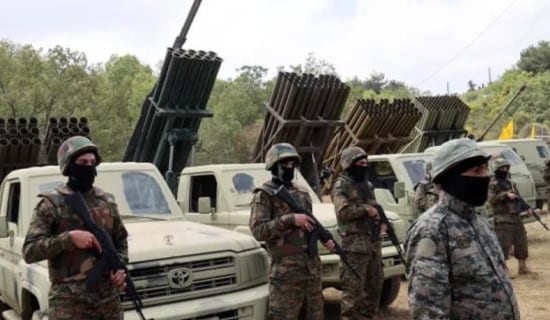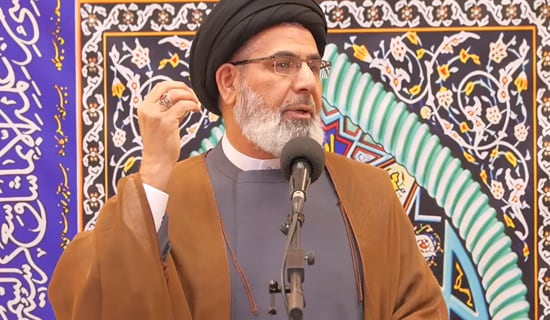The London daily Al-Sharq Al-Awsat recently published an interview with several Kurdish women fighters from the Kurdistan Workers Party (PKK). The interviewees spoke about why they had joined the party, and about its policy and stance vis-à-vis other countries such as the U.S. and Syria. During the interview, mention was made of a strategic alliance between Turkey and Iran, and it was also stated that Turkish incursions into southern Kurdistan were aimed at sabotaging U.S. plans in the Middle East.
Following are excerpts from the interview: [1]
A Female Fighter: My Life is Dedicated to the Liberation from the Turkish Oppression
A young female fighter, N.J.R., 34, from one of the villages from the Sharnakh area, who had joined the PKK over 15 years before, said that it was "the severe suffering of the Kurdish women in Turkey" that had prompted her to join the party ranks. She further stated that "the systematic policy of the Turkish authorities was to lock [women] up in their homes, to deprive them of opportunities to study, and to widen the gender gap with respect of social rights..."
N.J.R. continued: "As a Kurdish young woman, along with millions of other Kurdish women, I was forbidden to speak my native Kurdish language in my homeland. I excelled in academic studies throughout my school years. In high school, my grade average was high enough to get me accepted to medical school; however, the Turkish authorities subjected me to such insupportable pressure on account of my Kurdish ethnicity that I was forced to abandon my studies.
"A Kurdish woman living there [i.e. in Turkey] is under three kinds of pressure: the first due to her Kurdish ethnicity; the second due to her being a woman; and the third stemming from the lack of social justice and equality between man and woman. I became convinced that by joining the Kurdistan Workers Party, it would be possible to correct these unjust aspects of our lives... The speeches and lectures of leader [Abdullah] Ocalan made a great impression on me, filling me with hope that one day we will be delivered by virtue of the party...
"None of us can attain freedom alone, and here, between the mountains and valleys [of northern Iraq], the course of our lives is somewhat slowed down. Nevertheless, here I feel great freedom and liberty. Women who live in the surrounding villages do not have as much as one hundredth of the freedom with which we, young women, are endowed. The weapons we always carry for the lofty purposes of liberation fill our hearts with fulfillment and boost our morale... I am determined to devote my whole life to the struggle for the liberation of other women like myself."
A Strategic Turkey-Iran Alliance
Asked whether she expected an attack from Iran simultaneously with an attack from Turkey, a fighter calling herself Nawruz replied: "If this happens, the U.S. will never tolerate it; moreover, a joint attack of this kind would reveal the strategic alliance signed between Iran and [Turkish Prime Minister Recep Tayyip] Erdogan, which both sides are trying to keep secret.
"Early last summer, a Turkish military convoy was attacked by our comrades in arms in the Bingol region, well within the Turkish borders, and it was later discovered that the convoy vehicles had been loaded with Iranian weapons. The Turkish authorities, however, covered up this incident – which reveals the nature of the strategic agreement between Turkey and Iran.
"It can be claimed with certainty that the anticipated Turkish attack has nothing to do with us, but rather is related to steps contemplated by the U.S. as part of its plans in the Middle East. I believe that the crisis is connected to Iran.
"[This crisis] was dubbed, by Russian President Vladimir Putin and U.S. President George Bush, one of the precursors of World War III. It is part of the issue. Note that every time that disagreement between the U.S. and Iran is exacerbated, Turkey resumes military operations in the area of southern Kurdistan, in order to sabotage U.S. plans regarding Iran.
"It is this [sabotage of the U.S. plans] that is the ultimate aim of the anticipated Turkish attack – rather than the military operations against the Turkish army that our fighters carried out months ago in the Kabar area – which is some 600 km from the border with southern Kurdistan, according to the Turks' claims.
"It is common knowledge that [Turkey] had been preparing for this operation for a long time; it launched it by bombing the Senjar area in the Kurdish region of Iraq, with the full acquiescence and participation of Syria and Iran. This was a clear threat to the Kurds in southern Kurdistan, to show Turkey was in a position to strike them.
"At the same time, they were subjected to political pressure, when Ankara announced that it was not prepared to establish relations with a Kurdish tribal leader, hinting at [Jalal] Talabani, the president of the Iraqi republic. [Ankara] intended to harm his [i.e. Talabani's political] standing, as a kind of diplomatic pressure.
"In other words, Turkey had been preparing for this operation for a considerable time. This is evident from the recent explosions in Kirkuk, in which Turkey was directly involved. Their objective was to preempt the public poll regarding the future of Kirkuk. All this means that the aim pursued by Erdogan's government in this operation was much broader than [tackling] the Workers Party."
The Idea of Establishing an Independent State is No Longer Alive
Asked whether the [Kurdistan] Workers Party was continuing to pursue the agenda of establishing an independent Kurdish state or whether it had relinquished this idea, Nawruz said: "The establishment of an independent Kurdish state has been and will remain our main aspiration. However, our concept of a Kurdish state presupposes that the Kurdish people's political problems cannot be solved as long as there are powerful and subjugated and rich and poor, and as long as the discrimination against women as opposed to men in this state persists.
"So we thought that the best way to solve our problem was through political dialogue, albeit of a different kind, in the framework of [our] right to self-determination. In other words, the idea of establishing an independent state is dead and gone, and has been replaced by a claim to the self-determination of the Kurdish people via political dialogue, [i.e.] through peaceful means."
Regarding the party's Communist leanings, Nawruz commented: "At this time, we do not aspire to establish a Communist regime similar to the one that existed in the former Soviet Union prior to 1990; rather, we are working towards a democratic order, which will give each district or province the right to manage its affairs independently."
Ready for a Dialogue with Turkey
About the possibility of a dialogue, Nawruz said: "Yes, we are ready for it. Evidence to our [quest] for peace is our repeated announcements of ceasefire vis-à-vis the Turkish forces, although [the Turks] are concentrating their forces in great numbers in order to attack us. We are always emphasizing our readiness to conduct negotiations and a democratic dialogue, on condition that Turkey desist from military attacks, and prove its willingness to find democratic solutions to our problems."
We Avoid Harming Civilians
Nawruz further stated: "Since the declaration of armed hostilities in 1984, we carried out no terrorist operations inside the cities, and have always tried to avoid harming civilians in our armed operations. If any civilians were hurt during our operations, their number does not exceed one month's casualties in Iraq – in other words, we have not harmed civilians at all.
"However, if Turkey continues its attacks against southern Kurdistan and its pressure on our people in northern Kurdistan – such as, for example, arresting municipality heads or threatening Kurdish representatives in the Turkish parliament – and if it continues its chauvinist acts against the Kurdish people, then we will spare no effort, and will not hesitate to do everything in our power.
"Our intention is certainly not to harm civilians, since this is forbidden by our party's legal code; international law, on the other hand, openly stipulates that an area of fighting is open to any eventuality – in other words, the Turkish cities will also become a battlefield."
We Receive No Assistance from U.S. or Syria
To a question on the party's source of financing and weapons, Nawruz replied: "I would like to state clearly and unambiguously that, to this day, we have not received as much as half a dollar of assistance of of any kind or form, from any country or other element. All our means come from our party organizations, as well as from the assistance given us by our people."
On the source of its U.S. weapons, Nawruz said: "We categorically deny receiving weapons directly from the U.S. There are plenty of American weapons in the Istanbul markets, and anyone with money can buy them. If you go to Afghanistan, you will find that there too the Taliban fighters carry American weapons; also in Baghdad, members of extremist religious groups carry American weapons and guns with silencers.
"This certainly does not mean that the U.S. is supplying these groups with weapons, but rather that there is a market that trades [in U.S. weapons], and that we buy them there."
On the question of whether Syria is still supporting the Kurdistan Workers' Party, Nawruz commented: "Syria was the first country to declare its support for the Turkish attack after the Turkish parliamentary resolution regarding [the attack] was released – which means that we are not getting assistance from Syria."
There is No Connection with PJAK
On the current relations between Kurdinstan Workers Party and the Party for a Free Life in Kurdistan [PJAK], which is an opposition party active in Iran, Nawruz said, "PJAK was an independent political organization, carrying out its own political struggle in the eastern, that is, the Iranian, part of Kurdistan, and there was no connection between it and the party [i.e. PKK]."
We Have No Connection with Ocalan
Asked if her party was still receiving orders and instructions from imprisoned leader Abdullah Ocalan, Nawruz stated: "Certainly not. Our leadership has announced time and again that [our] leader Ocalan is [being held] under conditions which do not allow him to direct the party organizations. However, if political negotiations commence, or if a ceasefire is announced, then the orders will most definitely come from our leader Ocalan."
Asked if this meant that there was communication between them and their imprisoned leader, Nawruz said: "None whatsoever – until his lawyer, who met with him a month ago, informed us that [Ocalan] had lost 10 kg, and that his health had deteriorated."
[1] Al-Sharq Al-Awsat (London), October 17, 2007.








